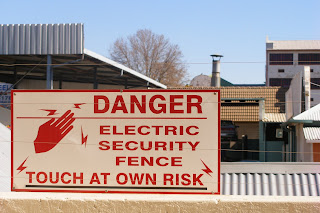
After 10 years of Thabo Mbeki’s rule, the fissures in South Africa’s ever complex socio-economic paysage have begun to advance at alarming speed. From bribery scandals and electricity shortage to rampant crime and physical persecution of foreigners – the alarm bells are signaling that the country’s hard won cohesion may soon be put to a severe test.
The failure of government delivery is obvious. For some 12 years I would visit South Africa regularly, sometimes staying for longer periods. I traveled around the country extensively and I fell in love with the natural beauty of this unique part of the world. But I was never particularly impressed by my South African friends’ reassuring comments about the “right monetary policies”, “the growth of the middle class”, “the strong Rand”, etc. Yes, wealth did change (few) hands. And yes, the instant aspirations were in asset accumulation, property, modern cars and large TV screens. The possession of most of these articles has also, thanks God, lost its defining skin pigmentation. But just driving through Cape Flats, Hillbrow or Alexandra was a chilling experience. And over the years little seemed to be changing there. The total abdication of the government’s responsibility for the plight of the most destitute citizens and the AIDS catastrophe became engraved in my memory as I chewed on those images. Suffering an almost complete walking ban in Johannesburg, I could reflect on my encounters with Mr Mbeki, Ms Mlambo-Ngucka, Mr Erwin, Mr Mboweni and others. Style, appearance, ideology, image and a fair amount of honest cognitive dissonance seemed to define their self-respect.
Implosion of Mbeki’s presidency is widely blamed for the sense of impending crisis. There is little doubt that the President’s devotion to personalized loyalism has contributed to many administrative shortcomings. But in the South African system of “guaranteed majority”, the accountability is a rare phenomenon. Ministers, bureaucrats and politicians are maintained and dismissed not for their performance, but for their perceived loyalty or lack thereof. While on a macro-scale Mbeki and his entourage have espoused Pan-Africanism, his micromanagement style has bordered on perilous communitarianism.

The mismanagement reached deeper echelons of the administration including the now famed collapse of the parastatal power monopoly Eskom. Lack of foresight and strategic planning are frequently fingerpointed as somewhat impersonalized culprits in this costly affair. But for several years the managers of the power plants were incentivized with bonuses for the uptime, which led to the limitation of periods devoted to routine maintenance of the infrastructure. It is therefore not a question of an isolated case of poor decision-making.
The anti-foreign pogroms this week have been a huge embarrassment for a country that has maintained a posture of human rights advocate with subregional and even global ambitions. The timing of the xenophobic outburst may be related to the accelerating headline inflation and the runaway food prices in particular. The blaming of “the Other” is a familiar theme and the economic sub-context is never far away. What makes these conflagrations more difficult to control in Africa is their tribal aspect, as we saw in Kenya recently. And as in Kenya, the attacks in Gauteng and Mpumalanga will eventually be brought under control. But it solves absolutely nothing in the long term. In several months, South Africans will be transfixed by the spectacle of a populist politician taking over the reins from his rival Thabo Mbeki. Jacob Zuma’s direct style, his questionable probity and devoted following among disaffected masses have sent ripples through the country’s political and business establishment. But the English language media’s alarmist attacks were dangerously monolithic. While many feared the outcome of the ANC leadership contest in late 2007, the actual process of competitive bids was refreshing in a country whose democratic institutions are distorted by antiquated legacy divisions and cosmetic floor-crossing.

The lingering fears of further disruptions, tribal rifts and forced redistribution of assets are too often shoved under the ideological soundbites and the delusion of racial harmony. A country of this diversity is difficult to govern and a lip service to “unity” or “rainbow” is of no help. A federal solution was once dismissed with a sleight of hand, but I have lingering doubts about the judiciousness of that hasty decision.
The tragic attacks on foreigners reveal the greatest failure of all. I did shop at Somali stores in Western Cape and I did trade with Senegalese art dealers in Joburg. In both cases, we had good business and joshed around about life and about Africa in general. I did not feel threatened, and nor did they. I am not even sure if they realized that I, too, was a foreigner. Each of them filled a niche in South Africa’s economic spectrum that “internal” migrants into Western Cape and Gauteng failed to fill. Why? Is it simply a “tradition” that Mozambicans work in the country’s mines? The apartheid-era education disaster explains less and less with every year. 20 months from now we will celebrate 20 years since Mandela walked free. That is already an entire generation. The rest of the world has moved on.

No comments:
Post a Comment